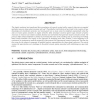Free Online Productivity Tools
i2Speak
i2Symbol
i2OCR
iTex2Img
iWeb2Print
iWeb2Shot
i2Type
iPdf2Split
iPdf2Merge
i2Bopomofo
i2Arabic
i2Style
i2Image
i2PDF
iLatex2Rtf
Sci2ools
101
click to vote
DATASCIENCE
2007
2007
Open Data for Global Science
The digital revolution has transformed the accumulation of properly curated public research data into an essential upstream resource whose value increases with use.1 The potential contributions of such data to the creation of new knowledge and downstream economic and social goods can in many cases be multiplied exponentially when the data are made openly available on digital networks. Most developed countries spend large amounts of public resources on research and related scientific facilities and instruments that generate massive amounts of data. Yet precious little of that investment is devoted to promoting the value of the resulting data by preserving and making them broadly available. The largely ad hoc approach to managing such data, however, is now beginning to be understood as inadequate to meet the exigencies of the national and international research enterprise. The time has thus come for the research community to establish explicit responsibilities for these digital resource...
Related Content
| Added | 13 Dec 2010 |
| Updated | 13 Dec 2010 |
| Type | Journal |
| Year | 2007 |
| Where | DATASCIENCE |
| Authors | Paul F. Uhlir, Peter Schröder |
Comments (0)

